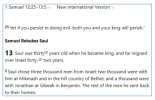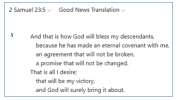God admonishes each of us:
1 Thess 5:21 Prove all things; hold fast that which is good. (KJV)
If you have proven to your satisfaction that the Bible you use is the Word of God, then the words of others regardless of source are just noise. We must come to trust that God acts in us, leads us, guides to the truth. That requires time in study listening to God, talking with God in prayer and allowing God to lead you to the truth.
Personally, I'm comfortable with the Bible I use for study and reading. God desires each of us individually to prove these things and then to trust God.
1 Thess 5:21 Prove all things; hold fast that which is good. (KJV)
If you have proven to your satisfaction that the Bible you use is the Word of God, then the words of others regardless of source are just noise. We must come to trust that God acts in us, leads us, guides to the truth. That requires time in study listening to God, talking with God in prayer and allowing God to lead you to the truth.
Personally, I'm comfortable with the Bible I use for study and reading. God desires each of us individually to prove these things and then to trust God.





